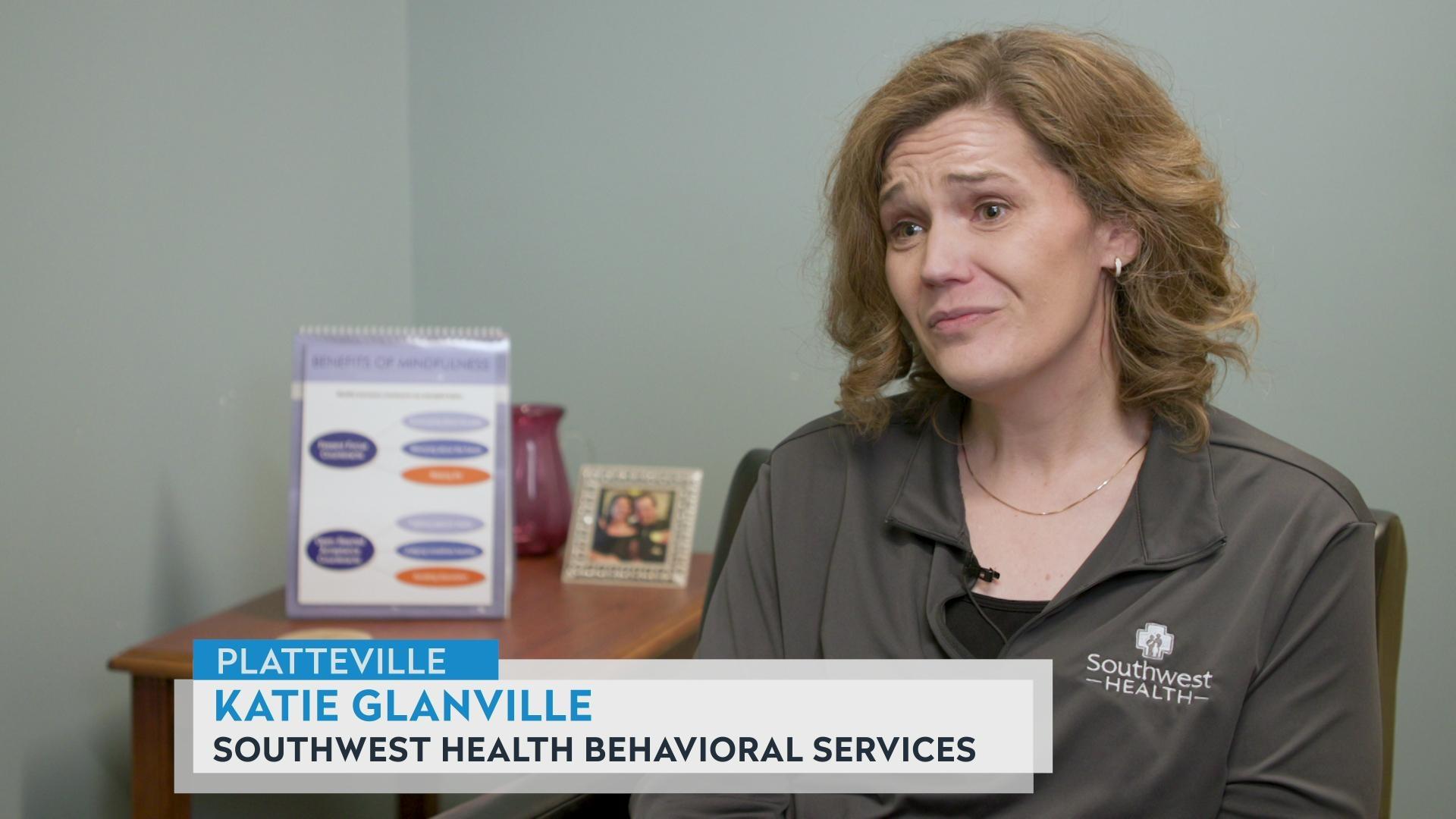Door County Underground | Hidden Acres Farm – Transcript
– This week on Wisconsin Foodie:
– I love getting up in the morning and goin’ for a boat ride. Our main focus is fishing trap nets for whitefish.
They’ve been looking for me for a long time, they were born to be food.
– Leaving here, they’ll be at a restaurant by three o’clock, a nice whitefish dinner.
– Tom: This is my fourth year as farm manager. Here at Hidden Acres Farm, we’re supplying to local restaurants fresh, organic, special stuff that they can’t find other places.
– Kyle: So how are you using it in tonight’s dinner?
– Well, we just need some of this chopped up. We really want to try and make these deviled eggs tonight to start the dinner.
– Welcome, everybody!
[chuckles]
– This such in-the-season and who-we-are on a plate. That’s really sublimely good.
– Narrator: Wisconsin Foodie would like to thank the following underwriters for their support:
The Dairy Farmers of Wisconsin are proud to underwrite Wisconsin Foodie and remind you that in Wisconsin we dream in cheese.
[crowd cheering]
Just look for our badge. It’s on everything we make.
Employee-owned New Glarus Brewing Company has been brewing and bottling beer for their friends only in Wisconsin since 1993. Just a short drive from Madison, come visit Swissconsin, and see where your beer is made.
Milwaukee’s landmark art deco hotel offers luxury accommodations, legendary hospitality, and world-class dining. Paired with the hotels roaring ’20s vibe makes The Ambassador a must-experience destination.
From production to processing, right down to our plates, there are over 15,000 employers in Wisconsin with career opportunities to fulfill your dreams and feed the world. Hungry for more? Shape your career with these companies and others at Fab Wisconsin dot com. Society Insurance. Small details. Big difference. Edible Milwaukee magazine.
Also, with support of the Friends of Wisconsin Public Television.
[light jazz music]
[car passes]
[chickens cackling]
[drink filling]
[chopping vegetables]
[fruit popping]
[meat sizzling]
[light jazz music]
[rhythmic jazz music]
[gentle guitar music]
– Charlie Henriksen: Well, I moved to Door County when I was 20, and I had a neighbor who asked me to help him ice fish the first winter I lived there. And one thing led to another, and when I was 28, I began fishing full-time.
We mostly supply restaurants. We have two fish houses, one in Algoma, Bearcats, and one in Gills Rock, Charlie’s Smokehouse that we supply. And then, we supply about 25 different restaurants throughout Door County. Our main focus is fishing trap nets for whitefish. And whitefish are a native species here that is fresh and sustainable and very healthy.
The net is a trap that funnels into the tunnel here. We’ll hold up that tunnel end so they swim through that into the net.
We have eight nets in this general area and we kind of vary how many we lift, depending on how much fish there is. Today, we’re going to lift five.
Beautiful fish here, all kinds. So lively I can’t catch ’em in the box. He’s so excited he’s reached his destiny.
They were born to be food.
They’ve been looking for me for a long time.
[fish flopping]
The fish have to be 17 inches for us to use them.
We’re geared up here today to catch somewhere between two and three thousand pounds. That’s what our target goal is and we’re right on track, I think.
I love getting up in the morning and going for a boat ride. I like the challenge of working with Mother Nature. Every net you pick up’s a lottery. You’re wondering, “What’s going to be in it?” you know. So, I like the gamesmanship it takes
[fish flopping around]
to be successful at this
[fish flopping]
and I like working with the guys I work with, so.
My son Will has been coming with me since he was a couple years old. He’s going to be 27 this year. So he actually started on this boat in his car seat, you know, strapped in. And so, he’s been working with me full-time now, for almost eight years and is in the process of taking over the business. All the shore work and the fish plant, he pretty much runs the crew and takes care of it.
– Will Henriksen: Working with my dad, it’s got its moments. I mean, there’s times where we’ll butt our heads, but it’s pretty easy and, you know, we consult with each other on different ideas, and what exactly we have goin’ on and want to do.
Once I was in school, I know, weekends and summers I’d help him out as much as I could. He might call it “going with” and “getting in the way,” but I felt like I was helpful.
So we just got to our processing plant in Sister Bay with around 3,400 pounds from the boat, and now, we’re going to process them. We’ll filet about 1,200 pounds for restaurants, and chunk between 600 and 800 pounds for fish oils today. We’ll weigh them out into hundred-pound boxes. And then, we run them through the different machines to scale them and filet them. Once Chip from the boat gets here, we’ll have him start pin boning fish. Chip is probably– I mean in the county– one of the best guys pin boning and he can do 15, 20 minutes to do a hundred pounds of filets. By the time we’re done, and leaving here, they’ll be at a restaurant by three o’clock to be served.
And a lot of people think that that’s just kind of crazy that it’s that fresh. A lot of people don’t understand how local their whitefish are when they see it on the menu, saying local lake whitefish.
So, after processing and getting the strip of bones out, we take and we’ll weigh ’em out in the specific amount for restaurants. This order’s going to be about– is 10 pounds, so we seal it up like so.
There’s one order ready to go the restaurants. A nice whitefish dinner.
[upbeat country music]
[gentle music]
– For most folks in the region, Door County is a place of pristine beauty and one for recreation, but it does have a great, storied agricultural history, as well. There are still over 700 farms active in Door County, but there’s also a new era of agriculture happening, with farmers like Tom Horsley of Hidden Acres Farms, who are starting to grow specifically for the restaurants. Chefs like Matt Chambas and his partner, Jamie Mead, of Door County Underground, who are here at Hidden Acres for part of their pop-up series. They’re cooking in the season. They’re cooking with ingredients from the region, and they’re reaching into the soil here at Hidden Acres for a multi-course dinner. It’s part of what makes Door County special and it’s part of the new era of this, our agriculture.
– Tom Horsley: Here at Hidden Acres Farm, we’re supplying for local restaurants fresh, organic, special stuff that they can’t find other places. I mean, the concept that was kind of developed here was a restaurant-sponsored agriculture, where we work with the chefs and the restaurants directly to produce things for them. So, yeah, we’ve got Romanesco zucchinis, which are a really nice Italian variety, the Aretussa eggplant, another Italian. One of my favorites, the Rosa Bianca, one of the more beautiful vegetables.
Green beans and some rainbow carrots. I mean, most of our sales is to restaurants, but we started this and it’s been pretty popular. People that come on the road, they’re always kind of like, “Wow, this is not your typical stuff,” so they’re pretty happy. You know, it’s like, I want to grow the best-tasting stuff, not the stuff that’s easiest to grow, or the best for shipping, and usually that stuff looks really good, too.
This is the Bayview Garden that we’re in, and this is our main commercial gardens for the restaurants. It’s about two acres total. In front of me here are the brassicas, broccoli, broccoli Romanesco, kale, the zucchinis. And then, this is the pepper row this year, which are doing really good, and then our row of tomatoes, 300 tomato plants. Our Charentais cantaloupe and then we have spring mix mustard greens, lettuce mixes. I like to grow a lot of different things, which makes it more interesting and probably more challenging. I mean, ten years ago, I had a little garden plot and it was kind of a novel thing if you sold something to the restaurants. They were kind of like, “Oh, isn’t that cute?” But now, it’s starting to become a real thing. I mean, in the last really, three, four years, well some of the places, like Wickman House and Trixie’s, and one of my favorite little places is Base Camp Coffee Shop.
I’m going to run this to Joel.
We’re going to make a delivery to Base Camp Coffee Shop, here in Sister Bay.
It’s run by Joel Kersebet, and he’s been probably one of my longest customers and he’s one of the closest to the farm here, so he told me two years ago that he was practically, in the summer, getting all of his produce from us, so.
– And tomatoes.
[speaking with French accent]
– Lovely. Oh, they’re the most beautiful tomatoes I’ve ever seen.
[laughter]
He’s great because he, you know, sometime I put him on the spot and he just show up like fifteen minutes later. So, that’s the benefit of fresh veggies, like, you call him and it’s very nice to be able to rely on that. It’s just the freshest veggies that you’re going to get, I mean it’s just like, all from the farm.
All individually harvested today and served to a customer right on the spot, so.
[gentle guitar music]
[dog barking]
– This is my fourth year as farm manager here, and then this is the community garden here. As a way to kind of involve the community in everything going on here so that people would, you know, rather than being like, “Oh, what’s going on?” They’d be involved. And we just have, you know, the usual, carrots and beans and tomatoes.
Stuff grows pretty well, we put a lot of compost in these beds, and they get watered every day by people. So, this is the chore board for the community garden. We write different chores and when people do them, they cross them off. Do some work and then pick what they feel is commensurate for the amount of work, and it works really well here, actually, everybody is– sometimes we’re telling people, “Take more stuff, take more stuff.”
So this is the processing for produce and the farm kitchen building that they built last year.
Tonight we’re having Door County Underground, which is doing monthly dinners, featuring our produce at the farm.
Hey, Matt.
– Hey, Tom.
– Smells good in here.
– Hey, thanks.
– All set for the dinner tonight for stuff from the farm?
– Almost, do you mind if I go up top? Just going to grab some herbs for garnishing.
– Alright, go, have at it.
– Alright.
– Tom: I think I’m going to go jump in the kayak.
– Alright, cool, we’ll see you later tonight?
– Tom: Sounds good.
– Alright, thanks, Tom.
Matt Chambas: We just love it here. It enables us to get really, really fresh produce. We know what everything’s looking like every step of the way. When I was a chef at Wickman House, Tom Horsley was one of my favorite farmers to work with. He still is, but now I work directly with him in the garden, part time. We get to really pinpoint how we want to approach these vegetables, when we want to harvest them, how we want them to look.
[gentle music]
– Chef Matt Chambas!
– Kyle.
– How are you, buddy?
– Good, good to see you.
– Yeah, what’s happening?
– Not much, just getting ready for this dinner. There’s a few more things that we could go grab from the garden, if you want to come with.
[gentle guitar music]
– Parsley’s right here.
– Oh, conveniently located.
– Yeah, home-grown parsley, this stuff. It tastes really good.
– And you know what, I’m going to, yeah, it’s a little dirty, but…
[Kyle munching]
– It really has a bright, distinctive, delicious flavor.
– It’s almost lemony, it’s almost citrus.
– Mm-hmm.
– Kyle: So how are you using it in tonight’s dinner?
– Well, we just need some of this chopped up for a nice look. We’re also going to be doing some deviled eggs tonight to start the dinner.
– Ah, that’s very Midwestern grandmother of you.
– Yes.
– To put some diced parsley on it?
– Yes.
– Yeah. And now some basil?
– Some basil.
– Kyle: Okay, so this is a farm that you also work at, harvest at?
– Matt: Yes.
– Kyle: So that’s a pretty serious connection to the food.
– It is, this has caught on obviously, local food, farm to table, very nichey words and phrases, but the cool thing is, Door County kind of goes back a long ways. This is more of what you would just do at home in your garden. Alright, so here we are at the basil patch.
– And a beautiful one it is.
– Indeed so.
– Three, four, couple varieties here.
– Yes, definitely. We’re going to grab a little bit of everything. We really want to try and make these deviled eggs kind of unique, with just different garnishes. Kind of the point is for people to pop a deviled egg and not really know exactly what they’re getting into until they start tasting it. Down at the end, we’ve got our normal, Genovese sweet large-leaf basil.
– Kyle: Good old classic like you see in the grocery store.
– Yes, however we’ve got some other varieties too, that are just awesome. This is Thai basil, and then, also, what we’ve been loving using is a mix of this lemon basil and then here is the lime basil.
– Oh wow, wow! That’s straight-up lemon, that’s like a lemon drop.
– It’s very lemony, the lime is extremely limey, and when you put them together, you’ve got lemon-lime pesto.
– [laughs]
How am I doing quantity-wise here? I don’t want to overwhelm you or the plant.
– You know, I think it’s probably pretty good. I’ve got a little stash of lemon, a little bit of lime, we really don’t need too much.
– Kyle: Right, ’cause it’s sprinkled on deviled eggs.
– Matt: Yeah.
– So, chef, I studied your menu board and I know that there are good things to come.
– Yeah.
[laughs]
– What are you working on now?
– So now, we got to grab some whitefish, and that’s just a quick, easy prep, but we’ve still got to get it ready.
– So, where do you get your whitefish? And do not say Lake Michigan.
[laughs]
– Well, it is Lake Michigan whitefish, but we get it specifically from Charlie Henriksen of Henriksen Fisheries.
– Okay.
– We love working with him and everybody in his crew. We’re just going to take off some belly fat, so we’ll get the pan really hot, we’ll add some canola oil, the fish’ll go in, we’ll throw in a little bit of butter. The rest is what we want to pair it with, and it’s very flexible, as far as what we can do with whitefish. It doesn’t have, like, a pronounced flavor like salmon or trout, for example.
– Kyle: Yeah.
– Matt: So, we can kind of take it in any direction that we want to.
– Kyle: Yeah.
– Matt: So if we cook this right we’re in business.
[guitar music]
– Jamie Mead: This idea has been in the works for a long time. It was really coming from just feeling worn out, of the restaurant life being very heavy during one dense season and then very empty in the other seasons. So, instead of wanting that, such an extreme lifestyle, we’re kind of trying to find the balance between the two. And getting to participate in the outdoors and all of the benefits of being in Door County. A bit part of it is the foraging food and bringing in organic, locally-grown food. It’s much easier to do that on a smaller scale, and so you can serve these foods that are easier when you’re not trying to fill a room, or, you know, 300 people a night. It’s community-style dining, so usually, people go home knowing somebody fresh, and that’s, I think, a good part of the experience.
– Kyle: Ryan Castelaz, Discourse Coffee. How are you, buddy?
– Good to see you!
– Good to see you!
– Wow, that was a coffee-infused hug.
– You know it. This is probably the most fun thing we’ve ever had the opportunity to do. Every recipe we do tonight is a one-time, one-and-done, that’s it. We’ve never made any of this stuff before, we’ll never make any of this stuff again.
– Kyle: This will never, ever?
– Ryan Castelaz: It’s specifically designed for these courses, for these people, for this night.
– I love it. I’m so glad you’re here, buddy.
– Ryan: Let’s do it.
– Kyle: Yeah.
– About half of the ingredients that we’re using tonight mirror exactly the ingredients that Matt’s using on the dishes. It’s just kind of a liquid take on his food. I see these drinks as garnish to Matt’s food. So, the first course in there is going to be deviled eggs. We’re priming you already for those deviled eggs. What Matt’s doing with food, and recreate that, and hint at that, through drink.
– So, cheers, guys.
– Yeah.
– Cheers. So we’ve got deviled eggs, and I kind of helped– well no, I picked some herbs for this.
– Yeah.
– Yeah, you did.
– You going to?
– Yeah, I’m going to do one too.
– Yeah, cheers, chef.
– Okay, cheers.
– Have good service, let’s have good service tonight.
– Matt: Thanks. Pretty good.
[clinking on glass with fork]
– Welcome, everybody, to Hidden Acres Farm, Door County Underground farm dinner, August 4th.
– We just would like to thank everybody for coming tonight. Next course is going to be an heirloom tomato salad. We’re going to have some fresh pesto underneath. We’ve got these beautiful tomatoes from, a little bit from here, they’re just coming into season, and from another one of our farms called Spring Creek. And on top of that is some fresh ricotta, some black garlic oil, and then, some spherificated black truffles, so we really hope you guys enjoy it.
[background conversation]
– Here you are, my friend.
– Alright, so heirloom tomatoes, and fresh ricotta.
This, for me, is the most exceptional expression of the season, the height of the summer, a Wisconsin tomato.
The truth is, I could just have a plate of this all night long.
That’s spectacular.
– Matt: So, now we’re plating up our lamb and beef agnolotti, zucchini from the farm, sage from the farm, lamb and beef from Door Karma Farms. On the bottom of the plate, we have some green tomato jam, and then it’ll just get Parmesan cheese on top.
[sizzling]
– This is a dish that is– all at once– fresh and bright, rich and silky. The richness comes from the agnolotti, then you’ve got the fresh and bright of the zucchini, and then the SarVecchio, the great Wisconsin Parm, that won internationally in that category.
Now, in the hands of any other chef, a dish like this might go off the rails, but because it’s Chef Matt Chambas, I know it’s going to be fantastic.
This is what perfect composition on a plate tastes like. This is a joy to eat.
– Matt Chambas: So, the main course is some Door County whitefish. It’s coming with some magic Mali fingerlings, some baby carrots. Those are both from the farm here. Some foraged chanterelles that we went out and got just the other day, and then we’re topping it with a crawfish Amricaine sauce.
– This crowning dish could not be more regional and American. This is such in-the-season and regionality and who we are on a plate. If the power of a great meal is that it gives us a greater sense of place, then tonight’s menu did exactly that. Through Chef Matt Chambas, through Farmer Tom, through Hidden Acres, we have a deeper sense of the things that grow here in Door County. This is something that I am so glad that I am able to enjoy.
Mm, that’s really sublimely good.
[relaxing music]
[upbeat music]
– Ryan Castelaz: This is one of the most fun things, I think, we’ve made for one of these farm dinners. This is a Chanterelle Simple. So we’re adding a quarter ounce mild lemon, then we’re doing just a little bit of tonic.
And then, finally, this one is getting topped with a fresh raspberry foam. We got raspberries from our partners at Waseda Farms.
– Shooter or sip?
– Sip.
– Sip.
– The flavors are bright and explosive. Keep in mind that’s going against crawfish, that’s going against whitefish. That chanterelle note is just meant to be reminiscent of what’s going on with the chanterelles that Matt’s cooking.
– He’s like a haiku of beauty,
[Ryan chuckles]
and I can just– I just stand back and look at him. Like I can’t, there’s no, I got nothing.
This is delicious, that was eloquent, I’m glad you’re here and I can’t wait.
– Narrator: Wisconsin Foodie would like to thank the following underwriters for their support:
The Dairy Farmers of Wisconsin are proud to underwrite Wisconsin Foodie, and remind you that in Wisconsin we dream in cheese.
[crowd cheering]
Just look for our badge. It’s on everything we make.
Employee-owned New Glarus Brewing Company has been brewing and bottling beer for their friends, only in Wisconsin, since 1993. Just a short drive from Madison, come visit Swissconsin and see where your beer is made. Milwaukee’s landmark art deco hotel offers luxury accommodations, legendary hospitality, and world-class dining. Paired with the hotel’s roaring ’20s vibe makes The Ambassador a must-experience destination.
From production to processing right down to our plates, there are over 15,000 employers in Wisconsin with career opportunities to fulfill your dreams and feed the world. Hungry for more? Shape your career with these companies, and others at FabWisconsin dot com.
Society Insurance, Small details. Big difference. The Wisconsin Department of Natural Resources.
The Central Wisconsin Craft Collective.
Something Special from Wisconsin. Illing Company.
Edible Milwaukee magazine.
Also, with support of the Friends of Wisconsin Public Television.
For more information about upcoming Wisconsin Foodie special events, dinners, and tours, please go to WisconsinFoodie dot com. There you can sign up for our mailing list to be the first to know about our events and offerings. Also, get connected with us through Facebook, Instagram, and Twitter.
[jazz music]
Search Episodes

Donate to sign up. Activate and sign in to Passport. It's that easy to help PBS Wisconsin serve your community through media that educates, inspires, and entertains.
Make your membership gift today
Only for new users: Activate Passport using your code or email address
Already a member?
Look up my account
Need some help? Go to FAQ or visit PBS Passport Help
Need help accessing PBS Wisconsin anywhere?

Online Access | Platform & Device Access | Cable or Satellite Access | Over-The-Air Access
Visit Access Guide
Need help accessing PBS Wisconsin anywhere?

Visit Our
Live TV Access Guide
Online AccessPlatform & Device Access
Cable or Satellite Access
Over-The-Air Access
Visit Access Guide
 Passport
Passport


















Follow Us